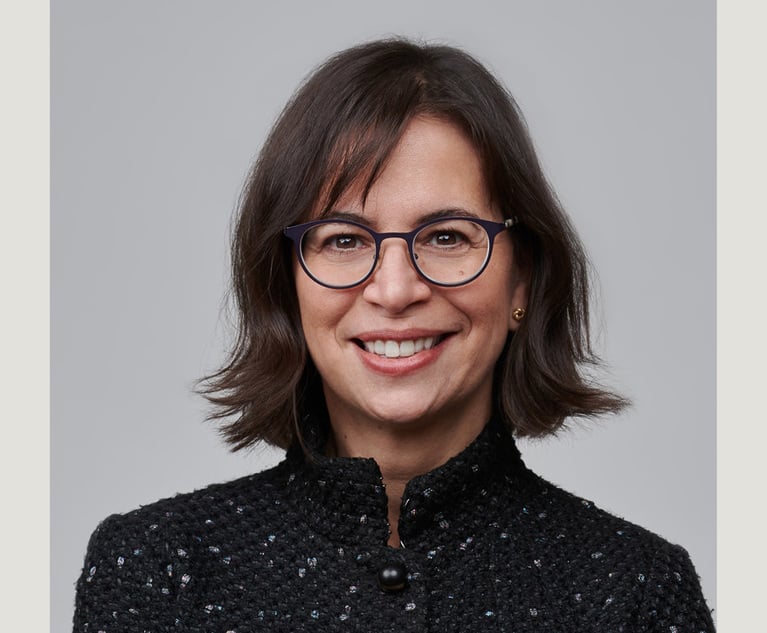Daily Dicta: Robbins Geller Settles Vereit Class for $1B. Are Opt-Out Plaintiffs Kicking Themselves?
Conventional wisdom says individual plaintiffs with big claims should go it alone for maximum control and recovery. But sometimes, it's better to be in than out.
September 11, 2019 at 12:46 PM
5 minute read
 caption
caption
To opt in or opt out, that is the question.
It may lack the poetry of Hamlet, but it's a perennial dilemma for potential class members with big individual stakes.
Conventional wisdom says go it alone for maximum control and recovery—glide along behind the class and collect a premium. But sometimes, it's better to be in than out.
Take the Vereit Inc. settlement. The real estate investment trust formerly known as American Realty Capital Properties announced on Monday evening that it settled a shareholder class action for $1 billion— $765.5 million from Vereit plus $225 million from the company's former external manager and its principals.
 It was a big win for lead plaintiffs counsel from Robbins Geller Rudman & Dowd. But what about funds including BlackRock, PIMCO, Vanguard and Atlas that opted out and already inked their deals? Did their lawyers from Boies Schiller Flexner; Bernstein Litowitz Berger & Grossmann and Lowenstein Sandler get their clients the maximum recovery?
It was a big win for lead plaintiffs counsel from Robbins Geller Rudman & Dowd. But what about funds including BlackRock, PIMCO, Vanguard and Atlas that opted out and already inked their deals? Did their lawyers from Boies Schiller Flexner; Bernstein Litowitz Berger & Grossmann and Lowenstein Sandler get their clients the maximum recovery?
According to DI Wire, one-third of the potential class had settled their individual claims over the past 15 months for a combined total of $233.2 million. Based on those payouts, you might expect the remaining two-thirds of investors—the ones who stayed in the class—to walk away with something like $466.4 million. Instead, they got more than double that amount.
What happened? And is it really that simple?
Credit certainly goes to a Robbins Geller team that included Darren Robbins, Jason Forge, Michael Dowd, Patrick Coughlin, Debra Wyman, Robert Rothman and Jessica Shinnefield. The veteran litigators were ready to take the case to trial, settling on the day that court proceedings in the Southern District of New York were originally scheduled to begin. (The trial date was recently kicked back several months by U.S. District Judge Alvin K. Hellerstein.)
Filed in 2015, the case stemmed from a massive accounting fraud at American Realty Capital Properties, or ARCP. The scheme "ultimately required ARCP to admit that it had falsified its reported operating performance and/or financial statements for every reporting period since it went public in 2011," wrote Robbins in a 275-page amended complaint. "The fraud also resulted in the termination or resignation of all five of ARCP's most senior executives and the majority of the members of its board of directors."
"Through a series of complex and oftentimes opaque related-party transactions, ARCP grew from a relatively modest-sized entity which owned 63 properties at the time of the IPO into a $21 billion behemoth that, only three years later, owned more than 4,400 commercial properties," Robbins continued.
But the rapid-fire acquisition strategy "was predicated upon an accounting scheme that was breathtaking in both its breadth and magnitude."
When ARCP in 2014 admitted that it had falsified financial statements, its stock (predictably) tanked.
In 2017, the company's former CFO, Brian Block, was found guilty of fraud and sentenced to 18 months in prison. He was also fined $100,000—a penalty that looks downright paltry compared to the $12.5 million he's personally coughing up as part of the class action settlement. (Score one for private enforcement of securities laws!)
Block was represented by Steptoe & Johnson lawyers including Reid Weingarten.
The settlement is also notable for extracting $49 million from the company's former auditor, Grant Thornton, represented by Sidley Austin.
ARCP was represented by Milbank lawyers including firm chairman Scott Edelman. ARCP founder Nicholas S. Schorsch was represented by Paul Weiss.
Really, the whole case was a veritable who's-who of big firms. Other defendants turned to Kirkland & Ellis; Kellogg Hansen; Zuckerman Spaeder; Weil Gotshal; Shearman & Sterling; Schulte Roth; Sullivan & Cromwell and Epstein Becker, among others.
So what about the opt-out plaintiffs? Did they settle on the cheap?
Lowenstein Sandler partner Lawrence Rolnick, who represented four hedge funds that settled their claims for $42.5 million in October of 2018, said no. "There's no question our clients did better because they opted out," he said. "We don't regret it at all."
While his clients' settlement details are confidential, Rolnick noted that the class only covered stock losses. His opt-out deal covered other kinds of securities such as swaps. And he also disputed that one-third of the investor base reached opt-out settlements. Other experts put the percentage of opt outs much lower, he said.
"Nobody knows how many shares are actually in the class," he said—or at least not yet.
Besides, Rolinck pointed out that the class members will have to wait for the notice to go out, for the settlement to be approved, for claims to be submitted and reviewed. On average, he said the process takes two to three years.
In the meantime, his clients—which are in the business of investing money—"already got paid."
This content has been archived. It is available through our partners, LexisNexis® and Bloomberg Law.
To view this content, please continue to their sites.
Not a Lexis Subscriber?
Subscribe Now
Not a Bloomberg Law Subscriber?
Subscribe Now
NOT FOR REPRINT
© 2025 ALM Global, LLC, All Rights Reserved. Request academic re-use from www.copyright.com. All other uses, submit a request to [email protected]. For more information visit Asset & Logo Licensing.
You Might Like
View All
Litigators of the Week: The Eighth Circuit Knocks Out a $564M Verdict Against BMO in Ponzi Case

Litigators of the Week: Second Circuit Tells Argentina to Turn Over More Than $300M to Bondholders

How One of the World's Largest Institutional Investors Approaches Litigation

Big Law and Litigation Finance Seem to Be Having a Moment
Trending Stories
- 1Uber Files RICO Suit Against Plaintiff-Side Firms Alleging Fraudulent Injury Claims
- 2The Law Firm Disrupted: Scrutinizing the Elephant More Than the Mouse
- 3Inherent Diminished Value Damages Unavailable to 3rd-Party Claimants, Court Says
- 4Pa. Defense Firm Sued by Client Over Ex-Eagles Player's $43.5M Med Mal Win
- 5Losses Mount at Morris Manning, but Departing Ex-Chair Stays Bullish About His Old Firm's Future
Who Got The Work
J. Brugh Lower of Gibbons has entered an appearance for industrial equipment supplier Devco Corporation in a pending trademark infringement lawsuit. The suit, accusing the defendant of selling knock-off Graco products, was filed Dec. 18 in New Jersey District Court by Rivkin Radler on behalf of Graco Inc. and Graco Minnesota. The case, assigned to U.S. District Judge Zahid N. Quraishi, is 3:24-cv-11294, Graco Inc. et al v. Devco Corporation.
Who Got The Work
Rebecca Maller-Stein and Kent A. Yalowitz of Arnold & Porter Kaye Scholer have entered their appearances for Hanaco Venture Capital and its executives, Lior Prosor and David Frankel, in a pending securities lawsuit. The action, filed on Dec. 24 in New York Southern District Court by Zell, Aron & Co. on behalf of Goldeneye Advisors, accuses the defendants of negligently and fraudulently managing the plaintiff's $1 million investment. The case, assigned to U.S. District Judge Vernon S. Broderick, is 1:24-cv-09918, Goldeneye Advisors, LLC v. Hanaco Venture Capital, Ltd. et al.
Who Got The Work
Attorneys from A&O Shearman has stepped in as defense counsel for Toronto-Dominion Bank and other defendants in a pending securities class action. The suit, filed Dec. 11 in New York Southern District Court by Bleichmar Fonti & Auld, accuses the defendants of concealing the bank's 'pervasive' deficiencies in regards to its compliance with the Bank Secrecy Act and the quality of its anti-money laundering controls. The case, assigned to U.S. District Judge Arun Subramanian, is 1:24-cv-09445, Gonzalez v. The Toronto-Dominion Bank et al.
Who Got The Work
Crown Castle International, a Pennsylvania company providing shared communications infrastructure, has turned to Luke D. Wolf of Gordon Rees Scully Mansukhani to fend off a pending breach-of-contract lawsuit. The court action, filed Nov. 25 in Michigan Eastern District Court by Hooper Hathaway PC on behalf of The Town Residences LLC, accuses Crown Castle of failing to transfer approximately $30,000 in utility payments from T-Mobile in breach of a roof-top lease and assignment agreement. The case, assigned to U.S. District Judge Susan K. Declercq, is 2:24-cv-13131, The Town Residences LLC v. T-Mobile US, Inc. et al.
Who Got The Work
Wilfred P. Coronato and Daniel M. Schwartz of McCarter & English have stepped in as defense counsel to Electrolux Home Products Inc. in a pending product liability lawsuit. The court action, filed Nov. 26 in New York Eastern District Court by Poulos Lopiccolo PC and Nagel Rice LLP on behalf of David Stern, alleges that the defendant's refrigerators’ drawers and shelving repeatedly break and fall apart within months after purchase. The case, assigned to U.S. District Judge Joan M. Azrack, is 2:24-cv-08204, Stern v. Electrolux Home Products, Inc.
Featured Firms
Law Offices of Gary Martin Hays & Associates, P.C.
(470) 294-1674
Law Offices of Mark E. Salomone
(857) 444-6468
Smith & Hassler
(713) 739-1250






